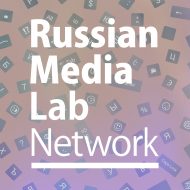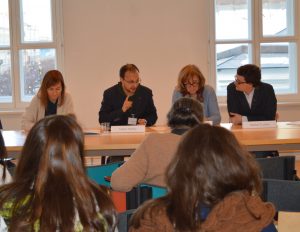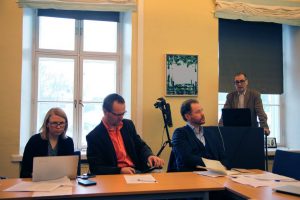Katja Lehtisaari
Oct 3 2016
The Russian media environment is influenced by global tendencies like the rise of digital media and changes in media use, and by more specifically Russian developments in media markets and media policy and regulation. As many researchers have stated, the Russian media model can be divided into two main formats: commercial capital and capital owned or manipulated by the state. At the beginning of the 2000s, it seemed that the position of privately owned media and media as business strengthened compared with the position of government-owned or subsidized media. At that time, the country was among the most rapidly growing advertising markets in the world. It seems that the equilibrium has after the years of marketization track in the beginning of the 2000s shifted towards the stronger position of the state-controlled side of the dichotomous model. There are both market and political factors influencing this development.
The political factor includes media policy and regulation. Media regulation is based on the 1991 Mass Media Law. Once introduced, the law was regarded one of the most liberal press laws in the world. At the same time, several other laws restrict media freedom, among them the anti-terrorism legislation and regulation on children’s information security. According to some estimates, the volume and restrictiveness of media legislation in Russia has increased in 2010s. Policy interventions introduced uncertainty into the commercial media’s operational environment because of several rapid, unexpected changes. Among these are the law on advertising on cable TV channels in 2015 and the law on foreign ownership that came into force in 2016. The first one bans advertising for those cable channels that do not show at least 75 % domestic productions. According to the second one, the foreign ownership share of media companies is limited to no more than 20 % of total shares. In response to this law, some foreign owners started to reduce their share in Russian companies in 2015. Withdrawals can have also had economic motivations, as in the case of Finnish Sanoma, which, during recent years, diminished its shares in Russian media companies.
When it comes to market factors, especially the traditional print media industry has suffered from the downturn in economics, mainly due to shrinking figures in advertising. In 2015, according to the figures of Russian association of communication agencies (AKAR), the advertising in media in overall fall by 10 %, compared with 2014, while the fall in newspaper advertising was as high as 29 % and in TV, 14 %. Thus, while remaining the central media platform, also TV suffers from the loss of advertising revenues. Internet was the only media sector with the growth of advertisement in 2015 (+ 15 %).
The newspaper market, which, in recent decades, has become more diverse in terms of the number of outlets, is under pressure also due to digital transition and changing media use. The reading of paid, traditional papers has fallen the most radically while free newspapers such as Metro have strengthened their readership numbers. Newspapers are still relatively important sources of local and regional information even as their role at the national level has diminished. The rise of digital media represents a mixed picture, in part because of growing political pressures and because the Internet has proved to be a challenging environment for finding new sustainable business models.
Based on the market and political development, the operational environment has become more challenging for small, independent commercial media and for foreign-owned media, while large media holdings continue to grow, partly through mergers and acquisitions. Part of the media business is owned by the so-called oligarchs or business tycoons, who may have other business and political interests besides the media.
It seems that the development in Russian media is towards increased manoeuvring by the state or stakeholders near to it. Based on expert opinions and recent research reports, the latest developments in the media market and media regulation seem to lean towards the continuation of ownership concentration on the hands of wealthy Russian owners while the number of non-instrumental commercial publishers, especially foreign investors, is diminishing. However, much depends on how the government and other political actors, including influential oligarchs, decide to move forward and how the economic situation affects the media market in the long term.
In this media environment, online media has both the potential to become a stronger arena for public discussion or to become more restricted. In economic terms, however, this media sector has the best prospects regarding advertising income at least in the short term.
This entry was published in Baltic Rim Economies, issue 2/2016, 20 May 2016. Available at http://www.utu.fi/en/units/tse/units/PEI/BRE/Documents/BRE_2_2016.pdf


